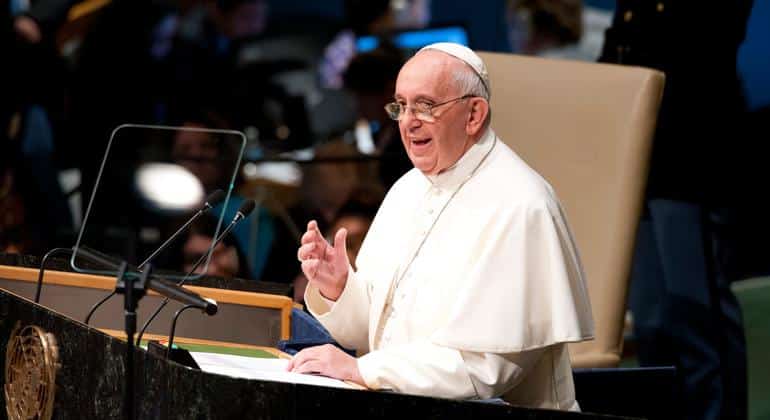The Secretary-General of the UN has expressed deep sorrow for the death of Pope Francis, who passed away on Monday in the Vatican at the age of 88. Jorge Mario Bergoglio, who made history as the first Latin American pope, was elected in March 2013 and during his papacy stood out for his commitment to the values of peace, social justice, and human dignity.
António Guterres, UN Secretary-General, paid tribute to his legacy, emphasizing his tireless dedication to the organization’s core principles, particularly in the fight against climate change and his advocacy for migrants and refugees. “Pope Francis was a transformative voice for peace, human dignity, and social justice. He leaves behind a legacy of faith, service, and compassion for all,” said Guterres, who added that the world could greatly benefit from following the example of unity and understanding promoted by the Pope.
In his only visit to the UN in September 2015, Francis warned about the ecological crisis and the dangers it poses to humanity, openly criticizing the consequences of an economic system that prioritizes ambition over the common good.
Meanwhile, the situation in Gaza is alarming. More than 11,000 people remain missing and an estimated 92% of homes have been destroyed or severely damaged by recent bombings. Many families are living among the rubble of their homes, often unable to retrieve the bodies of their loved ones. Muayyad Dahdouh, a Gaza resident, shared his distressing experience of having to wait over a year to retrieve the body of his brother, trapped under the debris of a building after an airstrike.
The lack of resources and proper equipment for debris removal further exacerbates the crisis, and UN projections suggest that this cleanup process could take over two decades.
In a different context, the Special Envoy of the Secretary-General for Haiti has raised the alarm about the crisis in the Caribbean nation, which is at a critical point due to the increasing violence of gangs seeking to expand their territorial control. “Haiti could face total chaos if effective action is not taken at the international level,” she warned. The situation has generated growing skepticism among the population about the state’s ability to meet their needs.
Finally, on Monday, the twenty-fourth session of the Permanent Forum on Indigenous Issues began, focusing on the implementation of the United Nations Declaration on the Rights of Indigenous Peoples. Aluki Kotierk, a Canadian indigenous leader, was elected president of the forum and highlighted the importance of protecting the rights, dignity, and well-being of indigenous peoples worldwide.
Source: MiMub in Spanish










